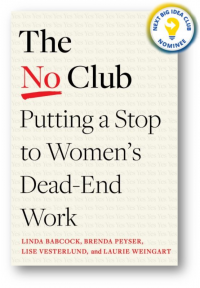On the Road with The No Club
by Garrett Kohno, PhD student

In every organization, there are tasks that few people desire to take on. Organizing team gatherings, taking notes in a meeting, serving on committees, the list goes on. They are duties that, while crucial for the functioning of a workplace, often have little to do with one’s actual job requirements. They most often fall on women, a pattern which could be holding many women back from progressing in the workplace.
Professor Lise Vesterlund and her collaborators Linda Babcock, Brenda Peyser, and Laurie Weingart explore a key reason why gender differences in labor market outcomes persist despite significant female educational advances in their recently released book, The No Club: Putting a Stop to Women’s Dead End Work. Their work furthers our understanding of the challenges against women’s advancement by highlighting the allocation of what is referred to as non-promotable tasks, or NPTs. Over years of research Professor Vesterlund and her team have found that women have taken on more NPTs across a wide range of industries and occupations, both within academia and outside of it. Their analysis of a consultancy firm’s data found that the median woman employee is taking on 200 more hours of non-promotable work than the median man.
In studies run at the Pittsburgh Experimental Economics Laboratory (PEEL) with the help of graduate students and undergraduate Cohen Fellows, Professor Vesterlund and her team find that women are more likely to take on these types of tasks. Specifically, women are more likely to volunteer, more likely to be asked to volunteer, and more likely to accept direct requests to volunteer. This contributes to the formation of beliefs, and the general expectation that women will say yes to NPTs when they come around.
The No Club calls for changes both at an individual and an organizational level. Recognizing that tasks they refuse to do will likely become the responsibility of other women, coworkers not overburdened with NPTs can be allies by volunteering to take them on themselves, despite incurring a small cost. Organizations also have significant capacity to avoid placing excessive dead-end work on the desks of their female employees. For example, Harvard’s Kennedy School implemented a system in which points are given to faculty who take on teaching or administrative tasks, with a target number of points required in order to achieve a satisfactory performance review. Change can also occur through interrupting the status quo. At the University of Pittsburgh’s Kenneth P. Dietrich School of Arts and Sciences, asking for a volunteer to write the promotion committee’s report was replaced by Professor Vesterlund’s suggestion to randomize the assignment of the task by pulling names out of a hat. It was obviously fair, and so it stuck.
Professor Vesterlund’s research (both The No Club, and prior published work) has received attention from major media outlets (New York Times, Washington Post, Boston Globe, The Economist, Time Magazine, and Harvard Business Review) and she has since given numerous talks to those interested in learning more about NPTs and how they can seed change in the unfair allocation of them within their own organization.
